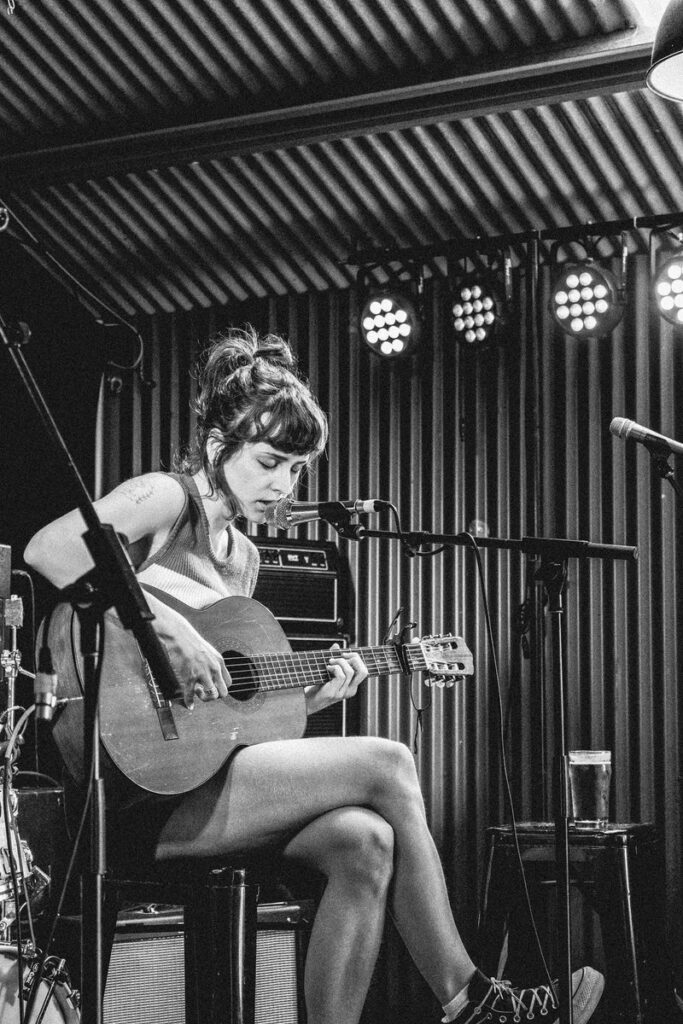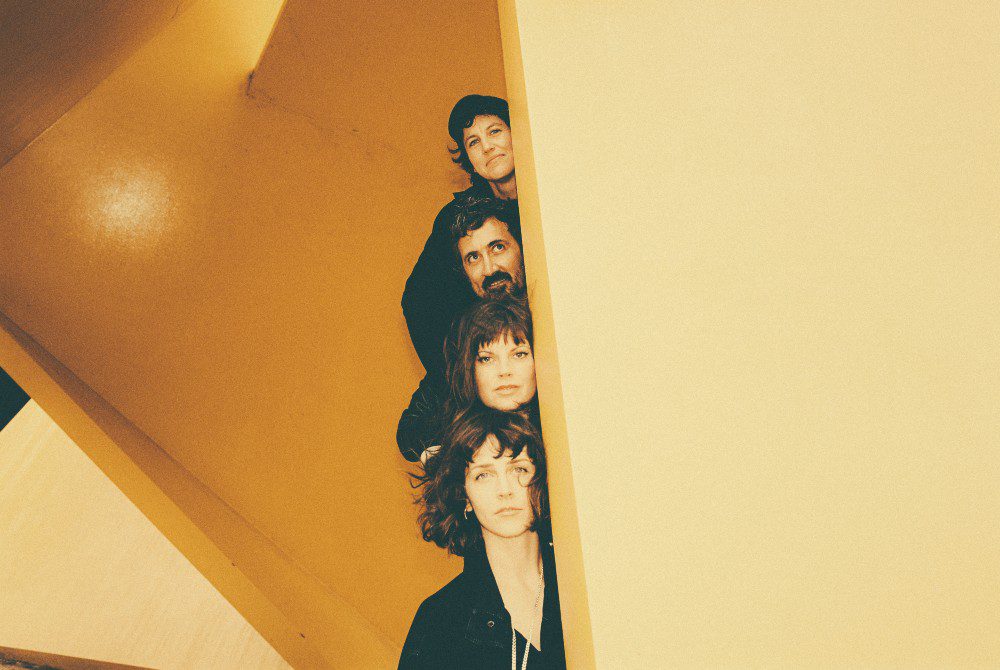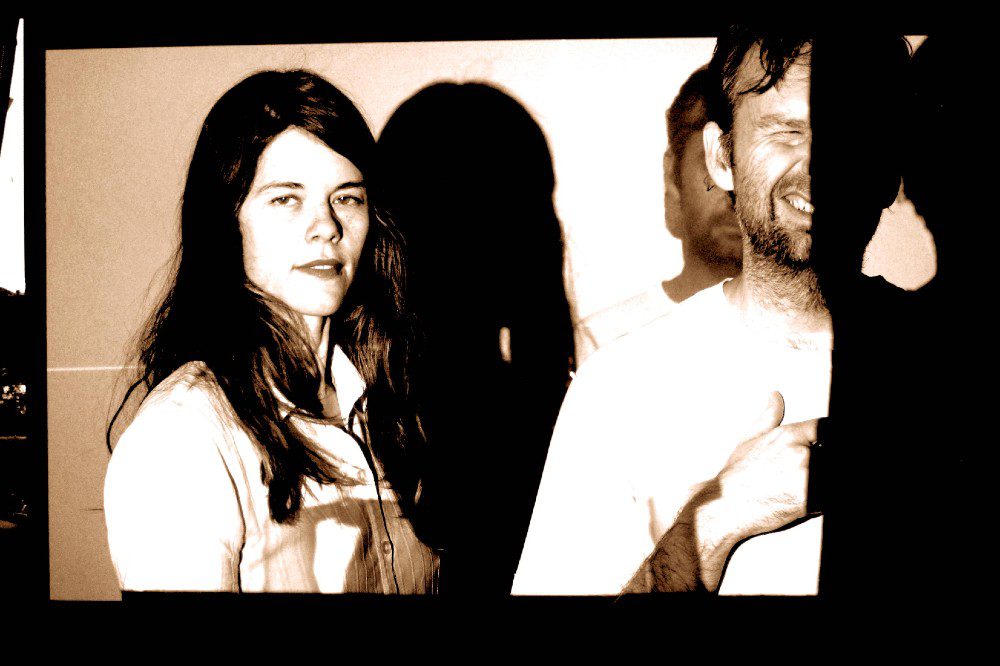

What’s more impressive than being the member of one of Melbourne’s most iconic rock ‘n’ roll bands? Being the member of several. Erica Dunn – of MOD CON, Tropical Fuck Storm, Harmony, and Palm Springs – is a rarity.
The signs were all there early, though. Her school guitar lessons morphed her into a non-stop busker at the age of 13. She recalls taking the train into Melbourne’s city centre with a friend, then “playing the most horrific, full-on, original compositions,” she tells Audiofemme. “We were really serious about it!”
Somewhere along the line, she recalls, she got into punk and rock ’n’ roll bands and immersed herself in the British live music scene. She returned to Australia and began hosting her own radio show (Mixing Up The Medicine) in 2008 – which ended up running for 11 years on Melbourne’s community station PBS 106.7FM before her schedule with Tropical Fuck Storm, MOD CON and Harmony took precedence. “I had this show that was my special little pocket, and I only had to give it up because we were touring so much. I still miss it,” she says.
Before leaving the show, she also began solo project Palm Springs to exercise her acoustic persona. Back in 2017, Dunn applied and got a songwriting residency in upstate New York, where she felt duty-bound to write a record. Palm Springs & Friends came out of that time; the album was released in limited edition on cassette, and the gorgeous, pared-back sound is reminiscent of recorded-to-tape, ’90s lo-fi bands. That’s no accident – she tracked most of the album at NYHed Studio, which she describes as “this amazing underground 8-track tape analog place on the Lower East Side. It was a real dream.” It was mastered by prolific producer/engineer/musician Mikey Young. Soon, Poison City Records will put out a Palm Springs best-of collection on vinyl. “It’s amazing that anyone cares,” Dunn says. “It’s really nice to think that someone values it and wants it out on record. Mikey’s been on the blower today because it’s his job to master everything.”

It is in Palm Springs that Dunn is at her most vulnerable, though her punk-rock soul meant she’d chafed at being boxed into the stereotype of a folk rock girl. “My relationship with just being a girl and a guitar, having that pigeonholed, I full on flipped and rebelled against that,” she explains. “It’s been interesting to get back, enjoy the depth of the craft, and just picking on a nylon string guitar, which is so terrifying and such a stretch of skills. There’s no distortion pedal, nothing to hide behind at all. I really love playing in that way.”
Around the time she started Palm Springs, she was living with Raquel Solier, who played drums on a few of the project’s early 7 inches. Along with bassist Sara Retallick, Palm Springs put out a tape called Flowers in a Vase as a three-piece, but their work together quickly mutated into the energetic, angular MOD CON. “When we began writing together,” Dunn remembers, “we saw that Palm Springs was one thing, but MOD CON is a whole other thing.” Their fabulous single from June, “Ammo,” is all-femme power-punk, with guitar sweeping over the atmosphere like a venomous tail. Ten days ago, they released a second single, “Learner in an Alpha;” both will appear on their forthcoming LP Modern Condition, out October 22 via Poison City.
“You start a little band and you never know the longevity of it or what’s going to happen… especially, three women. You play in punk bands in your 20s and then people have families, or they start to treat it as a hobby,” she points out. “Raquel became a mum, Sara does this high-level study, and I’m away all the time, but actually the three of us are like, ‘This is part of our identity, this is how we express ourselves.'” Dunn says it was “a great relief” that Solier and Retallick both opted to continue MOD CON.
But Dunn’s most well-known musical endeavor formed practically on a whim, and has endured, seemingly by happenstance, against all odds. She was on tour with dark pop project Harmony (“I Love You” on 2018’s Double Negative is both pleading and seemingly resigned, with its sad doo-wop harmonies, the thunk of a drum that sounds like it might just give up, and a sense of echoing loneliness around vocalist Tom Lyngcoln) supporting The Drones when she became fast friends with Gareth “Gaz” Liddiard and Fiona Kitschin. They’d just started a side project called Tropical Fuck Storm and were fleshing out the lineup, which would also come to include Lauren “Hammer” Hammel.
“We’d go up to their ramshackle place in the bush in the summer, hanging out. I’m not sure exactly when the conversation came about, but it took them a little bit of time to work out what they wanted TFS to be like,” Dunn recalls. “It was really exciting. There’s not that many people in Australia who can make music and live off that, and they spend most of their life touring. They’ve got big plans, always looking to make something out of nothing. One moment they’re like ‘Do you wanna jam?’ Then they’ve booked a tour to the States!” That’s exactly what Tropical Fuck Storm did, releasing debut LP A Laughing Death in Meatspace in May 2018, less than eight months after their first live shows.
“It was a crazy time, that initial year,” Dunn says. “It’s amazing working with people who are so gung-ho, who live, breathe and do. We made an album, then we were away playing hundreds of shows. It was intense, but then of course last year, we came to a total standstill.”

Dunn was in Melbourne, but domestic partners Liddiard and Kitschin live in regional Victoria, which was off-limits during lockdowns. “Gaz and I were trying to send each other videos and audio but it was crap because we’re so bad with technology,” Dunn says. “When the ring-of-steel lifted in November, I went and lived with them for three months and we recorded up there. It was strange, getting back into it. We’d been in a van all together every day, and we wondered if that intuition would ever come back. When you think you’ll never do anything like that ever again, it was so exciting to play as a band together again. I plugged my guitar in and was like, ‘Can I even use this?’”
In fact, Dunn plays guitar and keys and shares some of the vocal duties on Tropical Fuck Storm’s latest release, Deep States, which arrived in August of this year via Joyful Noise Recordings. The album “absorbs and distils some of the madness of the time” they spent getting used to one another again. “It’s funny – we were trying to have days off but we’re used to being up in each other’s grilles in a way. It was like I’d missed my family for a year and the ridiculous sense of humour we have grown together with,” Dunn says. “We’d work hard, then have times of just going swimming. We’d be trying to make a barbecue, but discussing the bridge, the harmony, the lyrics. Three months is a long time. It was a hard slog; it was great.”
So too, does Deep States mine the current political and social climate for all its gory, disturbing and darkly humorous gold. Single “G.A.F.F.” is a cosmic journey of fuzzy, furious feedback, raw daggers of reality delivered by Liddiard’s snarling vocals, all riding upon a twangy bassline that treads a narrow brick wall, threatening to fall and crash any moment. And, in Melbourne’s sixth lockdown, the sentiment – “Give A Fuck Fatigue” – hits home. Elsewhere, “New Romeo Agent” is a melodic post-punk ballad delivered over the gentle handclap-style drums and jangle of keyboard chords.
With so many of her projects finally releasing material again, Erica Dunn is not likely to leave Melbourne’s musical radar this year. There are even tentative plans to record again with Harmony. Hailed as something of a cult hero, Dunn explains her wildly prolific output rather humbly. “It’s funny to have these different hats and different projects,” she says. “The different things that I’m inspired by seem to present a different trajectory in what I’m making and doing.”
Follow MOD CON, Tropical Fuck Storm, and Palm Springs on Instagram for ongoing updates.


